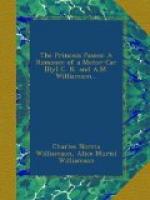Another exchange of words like brickbats afforded us the information, when translated, that we could obtain black bread, cheese, and brandy; also that we were welcome to sit before the fire.
I pushed the Boy in ahead of me, but he fell back. The stench which struck us in the face as the door opened was like an evil-smelling pillow, thrown with good aim by an unseen hand. Mankind, dog-kind, cow-kind, chicken-kind, and cheese-kind, together with many ingredients unknown to science, combined in the making of this composite odour, and its strength sent the Boy reeling into my arms.
“No, I can’t stand it,” he gasped. “I shall faint. Better freeze than suffocate.”
But I forced him in; and in five minutes, to our own self-loathing, we had become almost inured to the smell. Eat we could not, but we drank probably the worst brandy in all Europe or Asia, and slowly our blood began once more to take its normal course. A spurious animation soon enabled the Boy to start on again; one of the cowherds pointed out the path, and for a time all went well with our little band, even Fanny and Souris having revived on black crusts of mediaeval bread. But the half-hour in which we had been told we might cover the distance between chalet and hotel lengthened into an hour. The mist grew greyer, and thicker, and darker, misleading us almost as cleverly as its sophisticated English cousin, a London fog. Again and again we lost our way. Owing to the fatigue of the Boy and Innocentina, and the utter dejection of the unfortunate little donkeys, we could not walk fast enough to keep our blood warm, and my tweeds, in which I was buttoned to the chin, seemed to afford no more protection than newspaper.
When I remarked this to the Boy he replied with a faint chuckle that he felt like a newspaper himself—“a newspaper,” he repeated, shivering, “with the smallest circulation in the world. And if it weren’t for your dressing-gown there wouldn’t be any circulation left at all.”
The day, which had begun in summer and ended in winter, was darkening to night when Joseph, who was in advance, cried out that he had flattened his nose against something solid, which was probably the wall of the hotel. No blur of yellow light penetrated the gloom, but a few minutes of anxious groping brought us to a door—rather an elaborate, pretentious door, which instantly dispelled all fear that we had come upon another chalet, or perchance a barn.
[Illustration]
CHAPTER XXV
The Americans
“Is the gentleman anonymous?
Is he a great unknown?”
—SHAKESPEARE.




